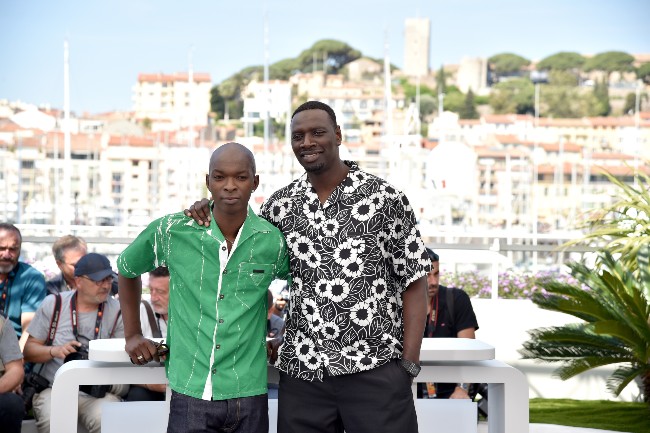Omar Sy Shines at Cannes in Gripping French-Senegalese War Film
- SUBSCRIBE
- ALREADY SUBSCRIBED?
BECOME A BONJOUR PARIS MEMBER
Gain full access to our collection of over 5,000 articles and bring the City of Light into your life. Just 60 USD per year.
Find out why you should become a member here.
Sign in
Fill in your credentials below.
Omar Sy burst onto the mainstream screen in the 2011 film Intouchables, and there’s been no stopping him since. The film, a hit, spawned an American adaption called The Upside, starring Kevin Hart, which wasn’t nearly as good.
As the star of Paris-shot Netflix hit Lupin, Sy delights audiences as a lovable jewel thief. He’s here on la Croisette in France for Cannes Film Festival (I passed by him yesterday, and he was charismatic and smiling), delighting people everywhere he goes. Notably, he joked with photographers at his photocall for his new film.
Sy is in Cannes for the presentation of his new film Tirailleurs (Father and Soldier is the film’s English title). Tirailleurs appears in this year’s “Un Certain Regard” category. The film is directed by Mathieu Vapedied, the art director of Intouchables. Sy and Vapedied again make film magic together. Sy also served as a producer of this film.
View this post on Instagram
The film tells the story of the Senegalese men unwillingly enlisted in the French army from 1914-1918. Focusing on a father and son pair, Vadepied underscores the horrors of colonialism and of war. The film was shot in Mawoundou, a Senegalese village in the Fouta Toto region.
Speaking at Cannes, the director says of his film, “I would like the viewer to have a sensory experience which touches their emotions more than their intellect, so that the greatest number of people feel and understand the way that French society is made up of so many different origins, particularly from Sub-Saharan Africa.” Vadepied continues, adding, “The film is not a full-frontal assault on the issue of the memory of colonialism.” Instead, he hopes it touches on the universal theme of family. “It aims to have a universal appeal through the simple story of a father and his son.”
Sy plays Bakary, 30, a husband and father living in a small village in Senegal. His family is ripped apart when, one day, Bakary’s son, Thierno (Alassane Diong) is rounded up, along with other young men, and captured to become soldiers for the French army to fight in World War I.
Thierno’s father, Bakary, goes to rescue his son from the army training camp in Senegal by enlisting in the army himself. But a botched nighttime escape plan, during which Bakary attempts to rescue other boys from the village at the training camp, leaves Bakary and Thierno in dire straits. “Never tell them I’m your father,” he whispers as they huddle together after being caught trying to escape. (The film reminded me, at times, of another father-son war film, Life is Beautiful, and how a parent’s drive to love and protect their child knows no limits, not even death.)
The father and son and other Senegalese soldiers are sent to France to fight for the country during World War I. Bakary, doesn’t speak French, only Fula. However, Thierno studied at a “white” school in Senegal so he can communicate for them. Bakary searches fruitlessly for someone who can speak Fula at the place where they are encamped, so he can find a passage back to Senegal for them.
Time and time again, Bakary tries to plan an escape route for them. Exercising all his options – including begging a local man to show him “mercy” – Bakary hits dead end after dead end. He tries to pay for them to be hired as cooks so they can avoid the frontlines. “You’re the 15th request I’ve had for that tonight,” the weary, Fula-speaking cook tells Bakary.
Meanwhile, the French army lieutenant (Jonas Bloquet) takes a liking to Bakary’s son, Thierno, and promotes him to the status of corporal. Thierno tells his dad about the promotion saying, “You must obey me,” when he assumes his new role. Bakary raises his eyebrows, and Thierno revises, “You must pretend to obey me.”
The film’s score, composed by French film composer Alexandre Desplat, is the perfect accompaniment to this suspenseful and heartbreaking story, which is accompanied by artful cinematography. The sound design is also top-notch; the audience will feel like they’re fighting in the war, too. Alongside other captured African men forced to fight for France, the Senegalese father and son march with men from Guinea, Sudan, and Nigeria. “You’ll be considered the heroes of this country!” the African men are told by an old white Frenchman, the army general – father of the lieutenant who tries to form a friendship with Thierno. The lieutenant tells Thieron of his own father, the general, “He thinks I’m underserving. I’ll only be worthy to him if I die in battle.”
Bakary finds what seems to be a surefire way for the pair to escape, but Thierno is enjoying his newfound power and position of corporal. He doesn’t want to go back to Africa. He wants to fight for France. “He’s been brainwashed by the white men,” a Senegalese army friend tells Bakary. Thierno finally agrees and he and his dad slip onto a horse-drawn cart carrying fallen soldiers. But when Bakary lifts his head, Thierno has disappeared – he returned to the battalion. Bakary again goes after him to save his son.
This powerful film was moving from start to finish, and Omar Sy brought a new level of depth to his performance. His playfulness and sense of fun – on full display here in Cannes – is matched in equal measure by a well of deep emotion, accessed with great success in Tirailleurs. For me, after the film I walked out of the theater with the strong urge to call my dad. And I think many who see this film will feel the same way.
Lead photo credit : Omar Sy at the PhotoCall in Cannes. Photo credit: Getty




